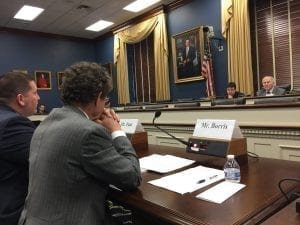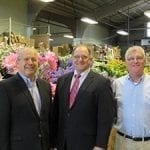
Skip Paal, AAF, was one of four small business owners asked to share small business challenges with House committee on Capitol Hill today.
When an influential House committee convened today to discuss small business issues, a longtime floral industry member was present to share his story — and make the case for the industry at large.
Skip Paal, AAF, of Rutland Beard Floral Group, headquartered in Cantonsville, Maryland, was one of four small-business owners asked to address a special hearing of the House Small Business Committee, “Making Washington Work For America’s Small Businesses.”
Paal, a fourth-generation florist and a member of the Society of American Florists’ board of directors, outlined the challenges his business faces, including the rising cost of health care and the difficulty of uncertain and unclear regulations, including those related to overtime laws and tax reform.
“While the overall economy is certainly in better shape than it was several years ago, it is important to understand that our industry and small businesses all over the nation are still experiencing significant challenges which are preventing entrepreneurs from fully attaining the American Dream,” Paal said, noting that his company’s health care premiums are set to increase by more than 30 percent — a spike that represents a continuation of a years’ long trend under the Affordable Care Act. “Increases of that magnitude are simply not sustainable.”

Skip Paal, AAF, was one of four small business owners asked to share small business challenges with House committee on Capitol Hill today.
Paal, who also participated last week in SAF’s annual Congressional Action Days, also discussed the potentially “devastating” effects of the border adjustment tax. His testimony already has been covered by The Hill, a Capitol Hill publication.
“Eighty percent of the flowers sold in the United States are imported,” he explained to committee members. “There is no domestic capacity to meet the demand. Flowers are not a necessity like food or housing. If our products are taxed at a higher rate, those costs will translate to higher prices and consumers will shift their spending to other products where flowers have traditionally been appropriate.”
Paal also made a thoughtful plea for committee members to put themselves in industry members’ shoes, particularly when it comes to “lack of clarity in legislation and regulations.”
“It is impossible for small businesses to make decisions and plan when legislation and rules are constantly changing,” he said. “I have discussed the challenges I face with several of my peers in different segments of the floral industry. Every single person told me their greatest concern was either uncertainty or lack of clarity.”
After the hearing, Paal said he enjoyed the experience and was pleasantly surprised by the bipartisanship in the room. Committee members, he said, seemed focused on “progressing small business, not their parties. From the questions I got, I could tell they were very concerned with small-business issues, regardless of their party. It was refreshing.”
Read Paal’s full testimony and watch video from the hearing.
This isn’t Paal’s first time making his case, and the industry’s, to Congress. In 2015, he testified before the Subcommitte on Health, Education, Labor and Pensions of the House Education and Workforce Committee.



